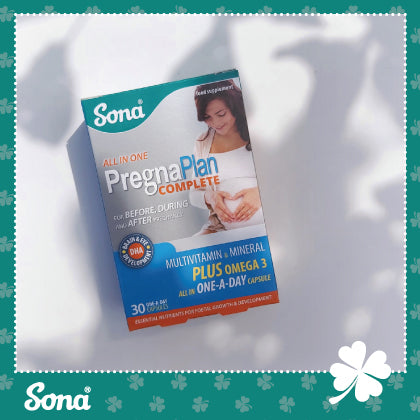
During pregnancy, it can be difficult to know whether you are receiving enough micronutrients through your diet, for both you and your baby.
Eating a balanced diet, with regular meals including all food groups such as carbohydrates, proteins and fats is a great start, but as your body begins to change, so may your appetite, cravings, and requirements.
In this article we will discuss the most important micronutrients to look out for during pregnancy, where to find them and when supplementation becomes necessary.
Calcium is a crucial nutrient for both mother and baby, helping to build your baby’s bones and helping to regulate your body fluids while pregnant. During pregnancy, women require at least 1000 micrograms of calcium, which ideally are split into two doses for maximum absorption throughout the day. Supplementation of calcium is generally recommended for women to ensure they are meeting their needs and is especially recommended for the second half of pregnancy to reduce the risk of developing pre-eclampsia.
Food sources of calcium include:
- Cheese
- Milk
- Yoghurt
- Tofu
- Dark leafy green vegetables
- Salmon
In 2019, a study found that up to 30% of women are anaemic, or low in iron. Low iron levels during pregnancy can have devastating effects on both mother and child, so ensuring you are receiving enough is crucial for the normal development of your child. Low iron in pregnancy is associated with poor cognitive and motor development in children, pre-term delivery, low-birth weight infants and low iron stores in babies.
Pregnant women require at least 27mg of iron each day, consumed or taken with a food source or supplement containing vitamin C to promote absorption.
Foods containing Iron include:
- Meat products
- Fish such as salmon or tuna
- Dark green leafy vegetables
- Eggs
- Fortified meat alternatives
Folic acid or folate is a very important nutrient which now is recommended for all women of childbearing age to supplement with. This is due to the importance of maintaining healthy folic acid levels during every stage of pregnancy, including before conception. Folic acid plays a major role in the prevention of spina bifida and anencephaly which are birth defects that effect the baby’s brain and spinal cord.
Women are recommended to supplement with 600-800 micrograms of folate each day, from food sources and through supplementation to ensure their needs are being met.
Food sources include:
- Nuts
- Beans
- Eggs
- Dark green leafy vegetables
- Meat products
Omega 3-fatty acids, and more specifically, ‘DHA’ a type of omega 3 fatty acid is a crucial nutrient, involved in every cell of our bodies. So, no wonder, DHA is also very important for pregnancy. For the baby, DHA helps to support brain development, eye development and nervous system development. To support the mother during pregnancy, DHA can help to prevent preterm labour, help to maintain a normal mood after birth and ensure the baby has a healthy birth weight.
Food sources of DHA includes:
- Salmon
- Mackerel
- Sea bass
- Shrimp
- Oysters
- Sardines
Sona PregnaPlan Complete
Sometimes, despite our best efforts, we may struggle to get all the nutrients we require from food alone. Sona PregnaPlan Complete is a supplement for before, during and after pregnancy. It is a complete one-a-day multivitamin and multimineral with omega 3 in each capsule. It contains 20 essential nutrients including the recommended 400µg of Folic Acid, Iron and Omega 3. It also contains DHA for healthy foetal brain and eye development.
References
Brannon, P.M. and Taylor, C.L., 2017. Iron supplementation during pregnancy and infancy: uncertainties and implications for research and policy. Nutrients, 9(12), p.1327.
Jackson, K.H. and Harris, W.S., 2018. A prenatal DHA test to help identify women at increased risk for early preterm birth: a proposal. Nutrients, 10(12), p.1933.
Kumar, A. and Kaur, S., 2017. Calcium: a nutrient in pregnancy. The Journal of Obstetrics and Gynecology of India, 67(5), pp.313-318.
Zhang, M.M., Zou, Y., Li, S.M., Wang, L., Sun, Y.H., Shi, L., Lu, L., Bao, Y.P. and Li, S.X., 2020. The efficacy and safety of omega-3 fatty acids on depressive symptoms in perinatal women: a meta-analysis of randomized placebo-controlled trials. Translational psychiatry, 10(1), pp.1-9.
